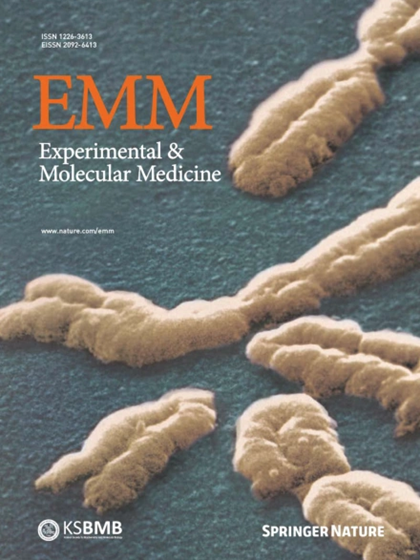Phospholipase C β4 promotes RANKL-dependent osteoclastogenesis by interacting with MKK3 and p38 MAPK
IF 9.5
2区 医学
Q1 BIOCHEMISTRY & MOLECULAR BIOLOGY
引用次数: 0
Abstract
Phospholipase C β (PLCβ) is involved in diverse biological processes, including inflammatory responses and neurogenesis; however, its role in bone cell function is largely unknown. Among the PLCβ isoforms (β1–β4), we found that PLCβ4 was the most highly upregulated during osteoclastogenesis. Here we used global knockout and osteoclast lineage-specific PLCβ4 conditional knockout (LysM-PLCβ4−/−) mice as subjects and demonstrated that PLCβ4 is a crucial regulator of receptor activator of nuclear factor κB ligand (RANKL)-induced osteoclast differentiation. The deletion of PLCβ4, both globally and in the osteoclast lineage, resulted in a significant reduction in osteoclast formation and the downregulation of osteoclast marker genes. Notably, male LysM-PLCβ4−/− mice presented greater bone mass and fewer osteoclasts in vivo than their wild-type littermates, without altered osteoblast function. Mechanistically, we found that PLCβ4 forms a complex with p38 mitogen-activated protein kinase (MAPK) and MAPK kinase 3 (MKK3) in response to RANKL-induced osteoclast differentiation, thereby modulating p38 activation. An immunofluorescence assay further confirmed the colocalization of PLCβ4 with p38 after RANKL exposure. Moreover, p38 activation rescued impaired osteoclast formation and restored the reduction in p38 phosphorylation caused by PLCβ4 deficiency. Thus, our findings reveal that PLCβ4 controls osteoclastogenesis via the RANKL-dependent MKK3–p38 MAPK pathway and that PLCβ4 may be a potential therapeutic candidate for bone diseases such as osteoporosis. Osteoclasts are cells that break down bone tissue, and their formation is crucial for bone health. This study explores the role of a protein called PLCβ4 in osteoclast development. Researchers found that PLCβ4 levels increase during osteoclast differentiation, suggesting its importance. The study used mice with specific gene modifications to understand PLCβ4’s role. The researchers used gene knockdown techniques and studied mice lacking PLCβ4 to observe changes in bone cells. They found that reducing PLCβ4 led to fewer osteoclasts and increased bone mass, especially in male mice. This suggests that PLCβ4 is vital for normal bone breakdown. The study concludes that PLCβ4 is crucial for osteoclast development by affecting a signaling pathway involving MKK3 and p38 MAPK. Understanding this process could lead to new treatments for bone diseases such as osteoporosis, where bone breakdown is excessive. This summary was initially drafted using artificial intelligence, then revised and fact-checked by the author.

磷脂酶C β4通过与MKK3和p38 MAPK相互作用促进rankl依赖性破骨细胞的发生。
磷脂酶Cβ (PLCβ)参与多种生物过程,包括炎症反应和神经发生;然而,它在骨细胞功能中的作用在很大程度上是未知的。在PLCβ亚型(β1-β4)中,我们发现PLCβ4在破骨细胞发生过程中上调幅度最大。本研究以整体敲除和破骨细胞谱系特异性的PLCβ4条件敲除(LysM-PLCβ4-/-)小鼠为实验对象,证明了PLCβ4是核因子κB配体受体激活剂(RANKL)诱导的破骨细胞分化的关键调节剂。在全球和破骨细胞谱系中,PLCβ4的缺失导致破骨细胞形成的显著减少和破骨细胞标记基因的下调。值得注意的是,雄性lysm - plc - β4-/-小鼠在体内比野生型小鼠表现出更大的骨量和更少的破骨细胞,而成骨细胞功能没有改变。在机制上,我们发现PLCβ4与p38丝裂原活化蛋白激酶(MAPK)和MAPK激酶3 (MKK3)形成复合物,以响应rankl诱导的破骨细胞分化,从而调节p38的活化。免疫荧光实验进一步证实了RANKL暴露后PLCβ4与p38的共定位。此外,p38的激活挽救了受损的破骨细胞形成,并恢复了由PLCβ4缺乏引起的p38磷酸化的降低。因此,我们的研究结果表明,PLCβ4通过rankl依赖的MKK3-p38 MAPK途径控制破骨细胞的发生,并且PLCβ4可能是骨质疏松症等骨病的潜在治疗候选药物。
本文章由计算机程序翻译,如有差异,请以英文原文为准。
求助全文
约1分钟内获得全文
求助全文
来源期刊

Experimental and Molecular Medicine
医学-生化与分子生物学
CiteScore
19.50
自引率
0.80%
发文量
166
审稿时长
3 months
期刊介绍:
Experimental & Molecular Medicine (EMM) stands as Korea's pioneering biochemistry journal, established in 1964 and rejuvenated in 1996 as an Open Access, fully peer-reviewed international journal. Dedicated to advancing translational research and showcasing recent breakthroughs in the biomedical realm, EMM invites submissions encompassing genetic, molecular, and cellular studies of human physiology and diseases. Emphasizing the correlation between experimental and translational research and enhanced clinical benefits, the journal actively encourages contributions employing specific molecular tools. Welcoming studies that bridge basic discoveries with clinical relevance, alongside articles demonstrating clear in vivo significance and novelty, Experimental & Molecular Medicine proudly serves as an open-access, online-only repository of cutting-edge medical research.
 求助内容:
求助内容: 应助结果提醒方式:
应助结果提醒方式:


